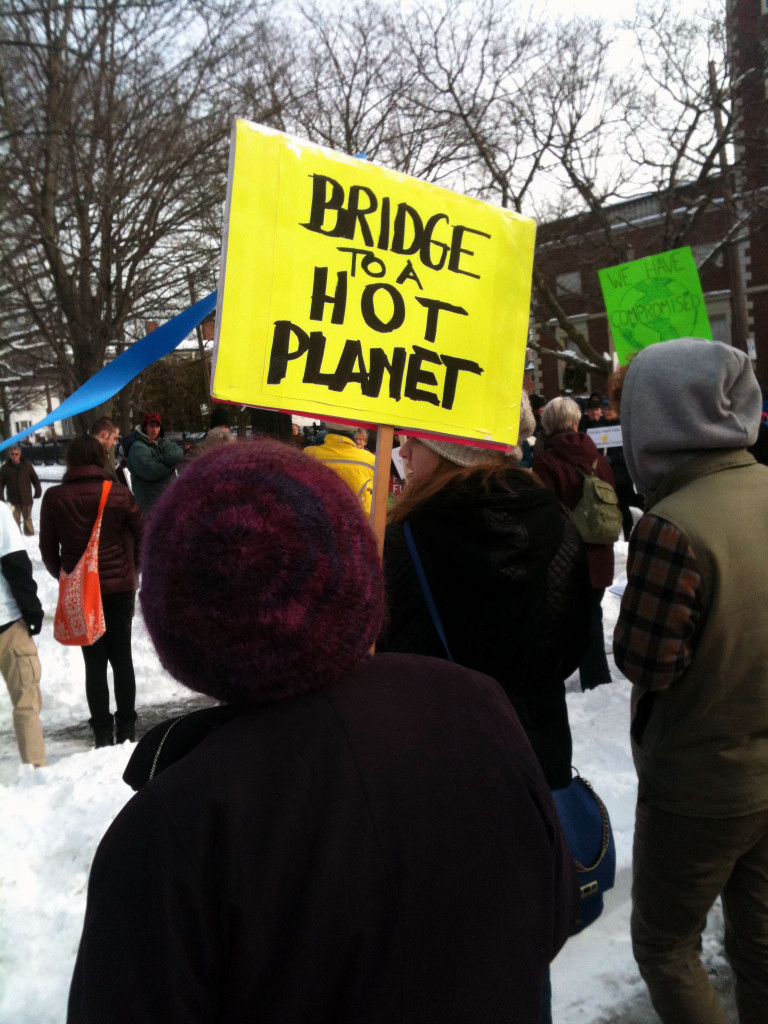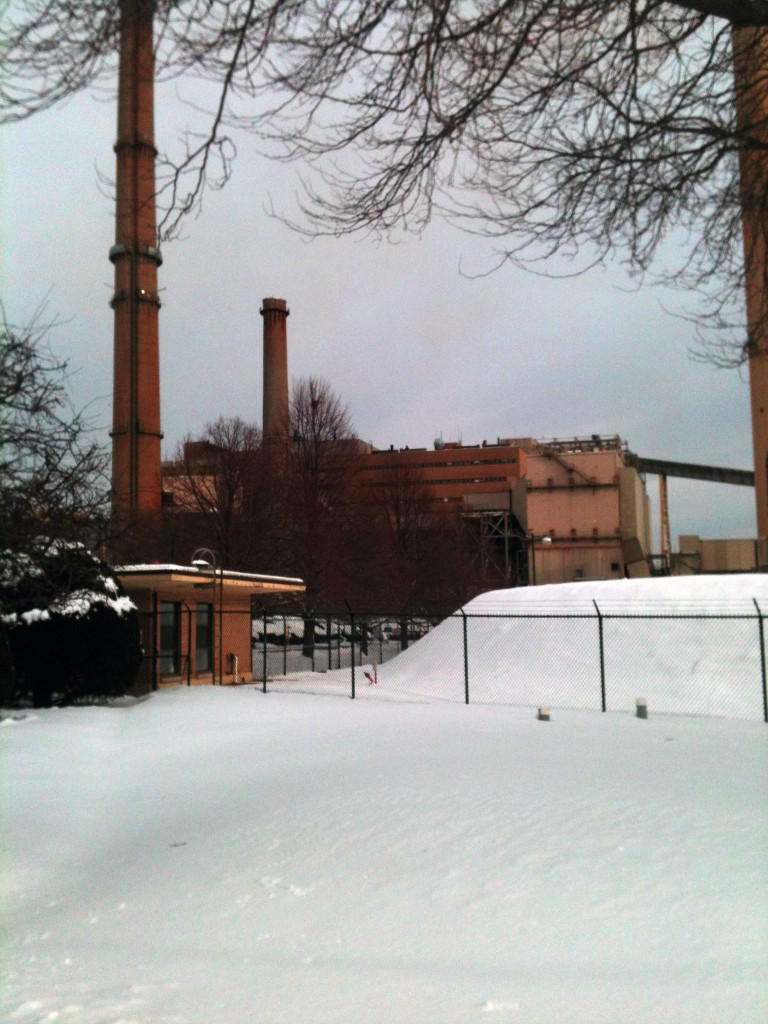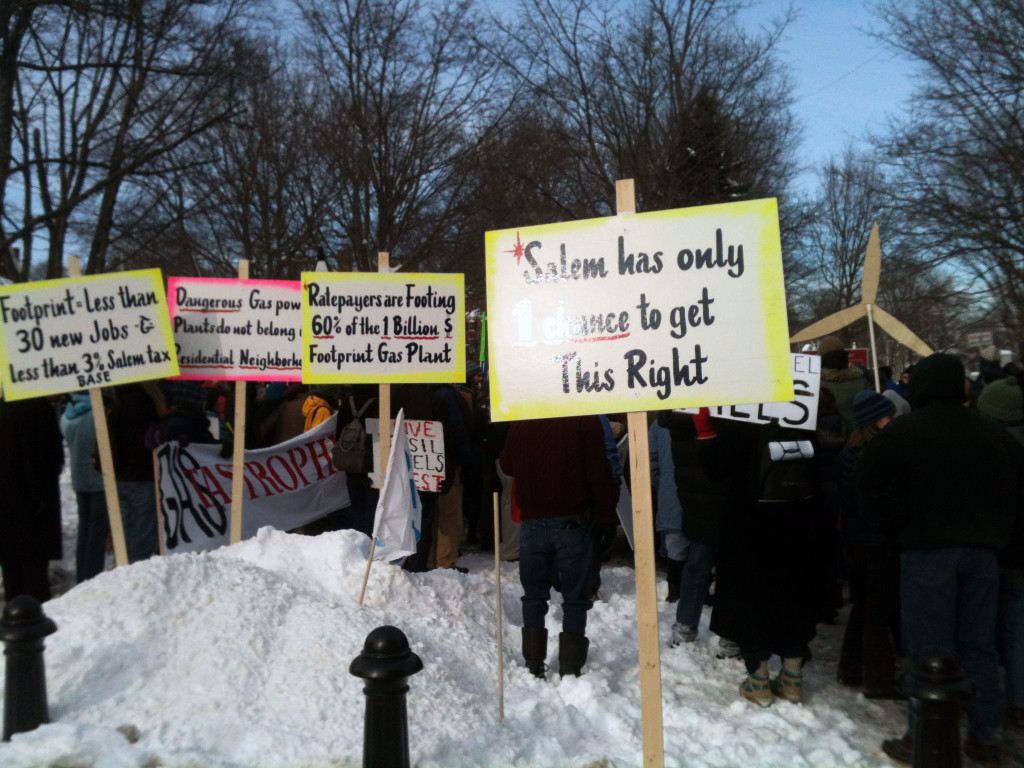The protestors gathered in the corner of Salem Common, opposite the Salem Witch Museum and across from a statue of Salem’s founder, cloaked and with a wide stone hat, who looks like a witch from behind. One of the protest organizers, Sue Kirby, was speaking into a megaphone at the corner of the park.
“Is a gas plant better than no plant?”
“Nooooo,” the crowd answered.
“When two-thirds of our power is generated from gas and not one wind turbine is yet generating electricity off the New England coast, one of the windiest coastal regions in the world, when do we say enough is enough?”
“Yeahhhhhh,” the crowd said.
Above the tree line at the other end of the snow-covered park, the gas plant poked up, small and quiet from here, its tower intermittently coughing gray fumes that might have been clouds. This was the Salem coal plant, scheduled to be shut down in May—good news for climate change activists, except that a company called Footprint Power was replacing the facility with a natural gas plant. Some say—President Obama among them—that this type of plan is a step forward in the fight against climate change. In his State of the Union a few weeks ago the president reiterated his support for natural gas as a “bridge fuel,” part of an “all of the above strategy,” intended to limit carbon emissions. But the protestors on Salem Common this Saturday, from various tribally aligned affiliate groups such as 350.org, the Better Future Project, and GASPP (Grassroots Against Another Salem Power Plant), aren’t in the mood for Obama pragmatism. Natural gas is made of methane, which is a more potent greenhouse gas than carbon dioxide when it leaks into the atmosphere, though it exists in smaller quantities. It contributes in a serious way to global warming. The point is the protestors here aren’t interested in compromising.
After Kirby wraps up her speech, climate marshals in reflective vests begin to usher the protestors along the shoveled path through the Common, beginning the half mile trek to the coal plant itself that will be the climax of the action. Police officers keep a watchful eye. “Carbon doesn’t have a neighborhood,” Kirby reminds the walkers, “It just goes everywhere.” Another organizer takes the megaphone from her. “We have a couple of wind turbines if anyone would like to help us out carrying that.”
The climate change movement is both broader and more organized than it has ever been, and part of that accomplishment manifests itself in the rhetorical talking points deployed by even the rank and file protestors. On the walk through Salem Common, Ellen Fine, from Needham, explains, “Natural gas is just code for fracked gas, and that’s just code for the oil industry.”
Christian Roselund, a correspondent for the climate news website Solar Server who is marching with his son on his shoulders, says, “There’s a variety of things we can do right now. I’ve spoken with wind developers who say there’s four gigawatts of cheap wind they can develop in Maine.”
Kathleen Dailey, from Salem, laments “what has just happened with the State Department and the pipeline,” referring to a report on the Keystone XL Pipeline that has reached the hands of the president, widely considered to be bad news for that particular battle.
Rachel Wyon, wearing a chef’s hat, (“Cooking up a recipe with no gas”) says, apropos of no question, “I’m a mother, and I hope to be a grandmother in the near future. My son hasn’t found the right partner yet.” But the implication is clear, and it’s a slogan bandied about regularly—it’s about our children, it’s about the future.
“Can I just add one thing,” a protestor asks, “There’s a big connection between agrobiz and energy in this country and that’s the main issue that I work on.” Above the yellow shutters on the yellow houses of Salem, seashells hanging in the windows, the coal plant tower, lights blinking faintly on top, grows larger.
By the time the marchers reach the plant, their numbers have grown to some hundreds at least. There are more speeches—“I’m 22 years old, the planet has been warming as long as I’ve been alive”—and the visual is stark, the bright signs and jackets against the snowy backdrop and the gray monotonous complex in the background, protestors’ breaths floating up into the atmosphere.
Across the street, outside the Salem Fire Department station and next to the Joseph J. Matula Memorial Basketball Court, a counter protest has gathered—the real Salem residents, they claim, who are also against the coal plant but see the natural gas facility as a step in the right direction: the compromisers, in effect. A man standing next to a sign that says, “We support Footprint, our neighbor . . . We actually live here,” says his name is Dennis. “Should I give my last name?” he wonders aloud. “Dennis,” he decides. “I came to support these guys,” he says. “I still live unfortunately in Boston but I’m here for everything in Salem.” Josh Turiel, Ward 5 Councillor, comes to his rescue. Turiel knowledgeably explains the benefits of getting rid of the coal plant, the struggle to find a better energy replacement, the space opened up for recreational activity, the idea of it as a stepping stone.
“You know, nobody’s perfect,” he says, “fossil fuel isn’t perfect, but we’ve got better. And there’s a lot of people out there, and most of them are beating on drums right now, who have an attitude that perfect is the only thing that’s ever acceptable. We want really good.”
The drums of Better Future and 350.org are banging. One of their rank shouts into a megaphone, “We love you all, we love your kids, we love your grandkids, we want you to have a beautiful future.” Some counter-protesters yell back, “Get a job.” Then: “Get a boyfriend!” Turiel joins in with his hands cupped to his mouth: “The street preachers that come here and piss us off in the fall say that too!” The fall, of course, is witching and tourist season in Salem.
Only in Massachusetts, perhaps, can two opposed protesting groups claim to be on the side of climate change—or only in 2014, maybe, though who can tell what will happen next. Footprint will have a hearing at the Massachusetts Supreme Judicial Court in March. Today, the hardliners leave the plant, now some 300 strong, and head to Derby Wharf for a street theater action. Turiel’s band stays a little longer—Turiel announces that they’ll be recycling signs responsibly if anyone wants to bring them over to him. The police officers get back in their car, an uneventful afternoon. One slightly shaken woman, walking down Block House Road with her dog, says she and her neighbor, who were on opposite sides of the protests, got into a bit of an argument. They both live right there, blocks from where they each stood holding signs. “I mean I don’t want to live next to a power plant either,” she says.



